Do you want to know if your WordPress website uses cookies?
Cookies are tiny files used by websites to store temporary information in users’ browsers. Many countries have different cookie laws that require website owners to disclose which cookies they use and what information they track and store.
In this article, we will explain how to find out if your WordPress website uses cookies and how you can manage those cookies to comply with local laws.

What are Cookies?
Cookies are small files containing data sent by a website to store in a user’s browser. Cookies play a significant role on the web and are widely used to improve user experience.
WordPress uses two types of cookies out of the box.
First, there are session cookies. These cookies are used to login and are set for all logged-in users on a WordPress website.
Then, there are comment cookies. These cookies are set when users leave a comment on your WordPress blog. Their purpose is to store user’s name, email address, and URL information so that they don’t have to re-enter it the next time they comment on your website.
Apart from WordPress, third-party plugins and tools may also set cookies for your WordPress website.
What are Cookie Laws?
Cookies are a powerful tool that can be used to track a lot of information about users. Considering the privacy risks, many countries and regions have enacted laws that set compliance guidelines for website owners.
For instance, European Union has GDPR Law and ePrivacy Directive. Similarly, countries like Canada, UK, Japan, and many more have laws that require website owners to get user consent and disclose the information they collect, store, and track about users.
That’s the reason why you see cookie popups on many different websites. These banners allow website owners to comply with GDPR, cookie laws, and other privacy laws in different countries.
How to See Which Cookies Are Stored by a WordPress Website
All modern web browsers make it easy to view the cookies set by any website you visit.
Google Chrome
In Google Chrome, first, you need to visit your WordPress website. After that, click on the Padlock or Not Secure icon in the browser’s address bar. This will open a menu where you need to click on ‘Cookies’.
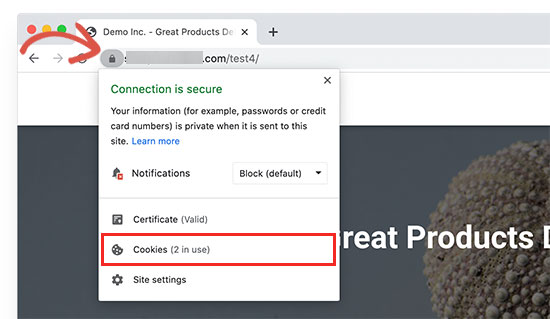
This will bring up the cookies popup where you will see all the cookies set by that particular website in your browser.
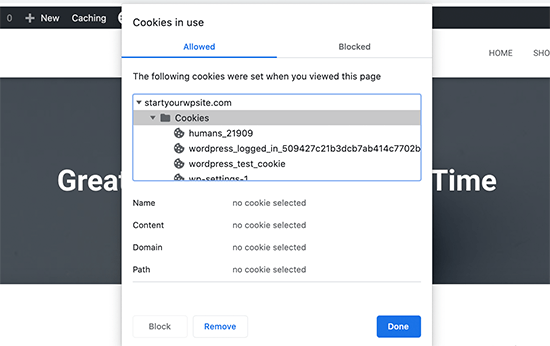
You can also view these cookies by using the Inspect tool. Simply visit your website and left-click anywhere to select the Inspect tool.
This will split your browser window and you’ll see the developer console panel. From here you need to switch to the ‘Application’ tab.
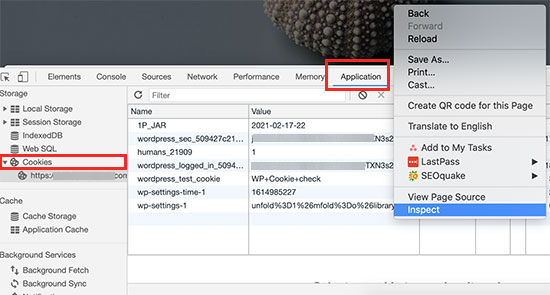
Next, you need to click on the Cookies menu from the left column and you’ll be able to see all the cookies stored on your site. More importantly, you’ll be able to see the data stored by the cookie under the ‘Value’ column.
Mozilla Firefox
In Firefox, you need to visit the website you want to check and then right-click anywhere to select the ‘Inspect Element’ tool.
This will split the browser window and you’ll see the developer console panel. From here, you need to switch to the ‘Storage’ tab and click on ‘Cookies’ to view all the cookies.
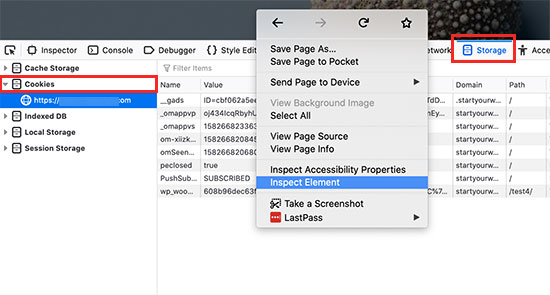
Plugins That Allow You to Turn Off Cookies
Now when reviewing cookies set by your WordPress website, you may notice that there are some cookies set by different WordPress plugins you are using.
As a website owner, you may not want to use these cookies to comply with cookie laws in different countries and limit your liabilities.
However, not all WordPress plugins come with easy ways to turn off cookies and make your website compliant. Following are some of the plugins that allow you to easily turn off cookies without breaking plugin functionality.
1. MonsterInsights
MonsterInsights is the best Google Analytics plugin on the market. It allows you to properly install Google Analytics and setup EU compliance addon.
First, you need to install and activate the MonsterInsights plugin. For more help, see our article on how to install Google Analytics in WordPress.
Once you have set up the plugin, go to Insights » Addons page and install EU Compliance addon.
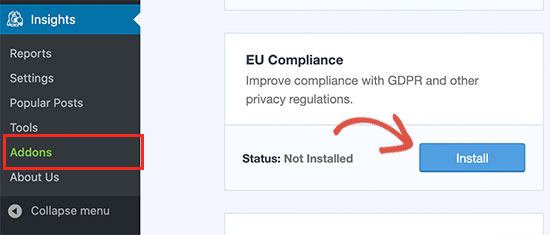
The addon works out of the box, and there are no settings for you to configure. You can see it’s enabled by visiting Insights » Settings page and switching to the Engagement tab.
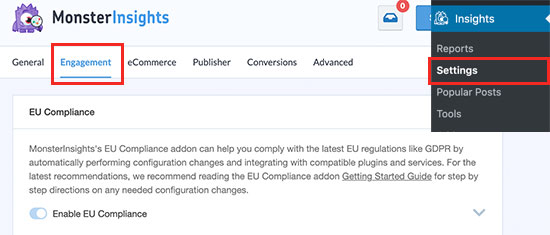
The addon will now automatically anonymizes IP addresses, disable the Demographics and Interests Reports, turn off user and author tracking, and more. It also integrates with Cookie Notice and CookieBot plugins automatically.
2. WPForms
WPForms is the best WordPress contact form plugin on the market. It allows you to easily create GDPR compliant forms for your WordPress website.
First, you need to install and activate the WPForms plugin. For more details, see our step by step guide on how to install a WordPress plugin.
Upon activation, you need to visit WPForms » Settings page and switch to the General tab.
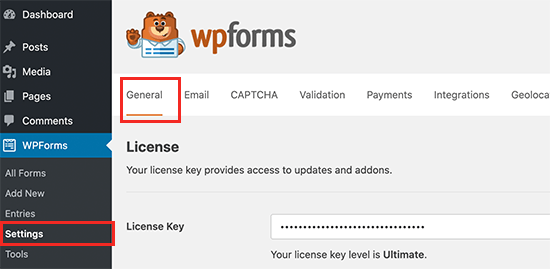
From here you need to scroll down to the GDPR section and check the box next to GDPR enhancements option.
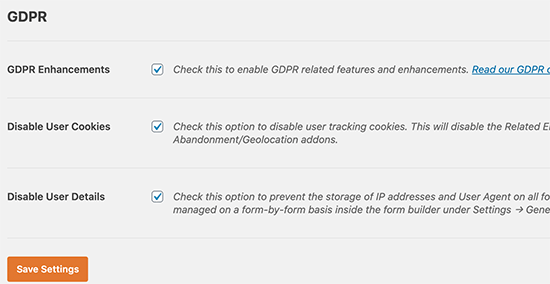
Checking the option will expand it and you’ll see the option to disable user cookies and user details for all forms.
WPForms also allows you to make individual forms GDPR compliant. For more details, see our article on how to create GDPR compliant forms in WordPress.
3. OptinMonster
OptinMonster is the best lead generation software on the market. It helps you create GDPR compliant optin forms and lead campaigns for your website.
It allows you to easily add a Privacy Policy with a customizable checkbox. Users can then only submit the form once they’ve checked the box. It also allows you to enable double optin for your forms.
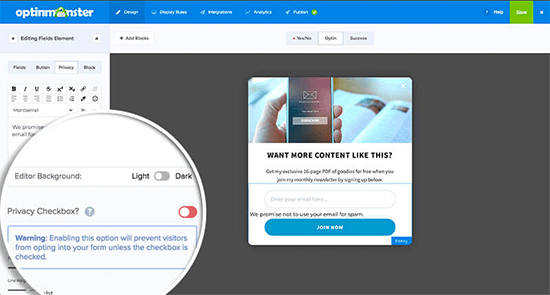
Plus, OptinMonster lets you target visitors based on their location. That way, you can make sure you’re showing GDPR-compliant optins to customers in EU countries. OptinMonster only creates cookies to improve user experience on your website and these cookies can only be utilized for on-site tracking.
4. Smash Balloon
Smash Balloon is the best social media plugin for WordPress websites. It allows you to create social media feeds that are compliant with cookie and GDPR laws.
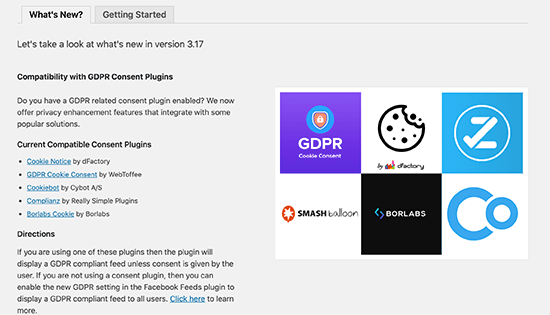
The plugin detects if you have a cookie notification plugin enabled and then holds any cookies until user give cookie consent.
More Ways to Comply with Cookie Laws for WordPress Websites
It is the responsibility of a website owner to comply with cookie laws in different regions. Here are some basic steps to make your website more compliant.
1. Add a Privacy Policy Page
A privacy policy page is legally required to comply with privacy and cookie laws in different regions. See our guide on how to easily add a privacy policy page to your WordPress website.
2. Install a Cookie Notification Plugin
Cookie notification plugins show a notification on your website that it uses cookies and seek consent from the users.
Cookie Notice and CookieBot are two of the most popular cookie notification plugins that are compatible with many other popular WordPress plugins.
For more options, see our list of the best WordPress GDPR plugins to improve compliance.
3. Keep an Eye on Plugins and Tools that Use Cookies
Check your website cookies to make sure that you can connect each cookie to a installed plugin and tool on your website. When installing new WordPress plugins or third-party tools, make sure to check if they have options to make them GDPR and cookie law compliant.
We hope this article helped you learn how to check if your WordPress website uses cookies and ways to make your website compliant with cookie laws.
You may also want to see our WordPress security guide to make sure that any data that you collect on your website is properly secured.
If you liked this article, then please subscribe to our YouTube Channel for WordPress video tutorials. You can also find us on Twitter and Facebook.
The post How to Know if Your WordPress Website Uses Cookies appeared first on WPBeginner.

No comments:
Post a Comment